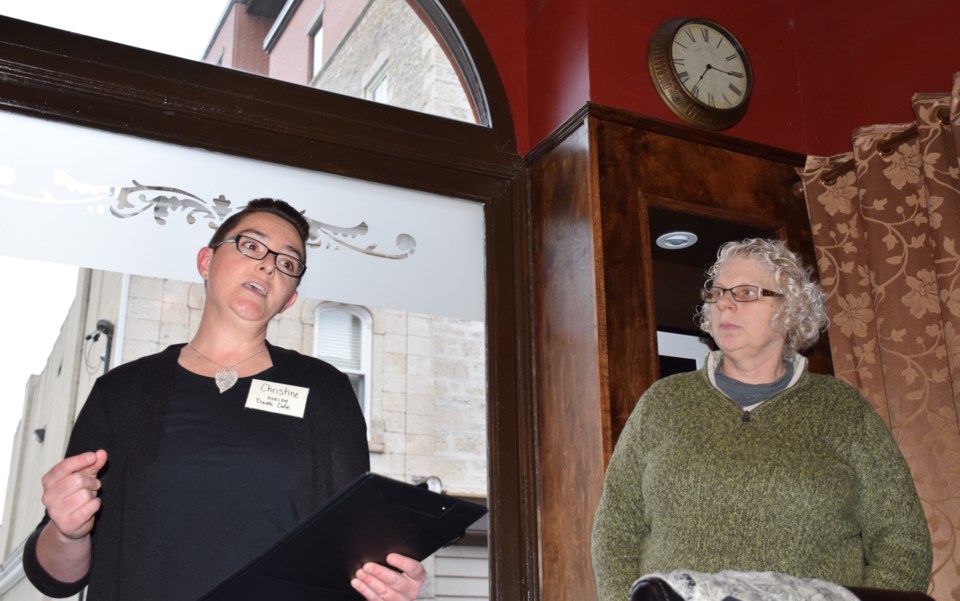Most everyone has experienced death to some degree. The subject is on the minds of many, and the pain of grief lingers just below the surface. And yet, we rarely talk about it.
That was not the case Tuesday evening, when about 50 people packed into the back section of the Red Brick Café on Douglas Street for the Death Café. The space was donated for the unique, emotionally-charged occasion.
All ages and all types of people attended, all sharing a common interest in speaking more openly about an unavoidable fact of life that is so readily avoided.
Far from being morbid, bleak or despairing, the mood of the event was equal parts sorrowful, uplifting, and caring. The room, at times a din of laughter and passionate story-sharing, was divided into a number of smaller groups, mostly consisting of strangers.
The intimate nature of the subject quickly created an atmosphere of empathy and trust, and the conversation flowed effortlessly.
Christine Lafazanos and Marion Willms facilitated the event. Both are trained in end of life realities. Willms is a registered nurse and death midwife with Departure Nurse, who supports individuals and their families in end of life care. Lafazanos is a certified life-cycle celebrant with Woven Threads–Handcrafted Ceremonies. She creates spiritual and secular wedding and funeral ceremonies.
“Death Café is a social movement,” Willms told the gathering, explaining that it began simply in the United Kingdom, in the home of a person who was passionate about starting conversations on the topic of death. “Now it has spread around the world.”
Lafazanos introduced the event as a “confidential space,” saying all stories and experiences shared were to remain confidential.
“I am aiming to create a space that is welcoming to all spiritual and religious beliefs, and to non-beliefs,” she said. “You are welcome to express your beliefs. However, this is not a place to debate what we think happens after we die. Let’s give respect to the diversity of perspectives and experiences that we come to the table with.”
She asked all present to take care of their emotional needs during and after the conversation, saying the subject can bring up vulnerable feelings.
Lafazanos and Willms stood back and allowed those in attendance to share their stories, their pain, and their beliefs about death with each other. Some told of accompanying a parent or dear friend in their death, others spoke of the sudden and confounding loss of a loved one, or the suffering, confusion or personal transformation experienced after a tragic loss.
And some articulated their fervent mystical/spiritual beliefs about the power of death, and their certainty about the existence of an afterlife.
For many, it was the first time they had spoken of death in a group, something, said Lafazanos, that is very rarely done in a culture that is afraid to talk of it.
But she said death is part of life and accepting its reality can lead to a greater sense of purpose and meaning in our lives. By realistically anticipating death we can choose to live more fully, joyfully and consciously.
“We live in a culture that fears death, that denies death, that over medicalizes death,” Lafazanos said in an interview. “Having public spaces with strangers to talk about death can often be less intimidating than talking to parents, children, family members, friends or partners. This is our hope – to begin the conversation and to change death from something we fear and avoid, to something we are comfortable and familiar with, so that we can die well.”
The Death Cafe model has risen dramatically in popularity. About 3,000 have taken place worldwide since it began in 2011 in the United Kingdom. The first one took place in Canada in 2012, in Victoria, B.C. So far there have been five such gatherings in Guelph and area.
Death Cafe is a chance to have thoughtful, respectful, relaxed and engaging conversations with others about death and dying. To learn more about the concept and its history, and to find out where upcoming events are taking place, visit www.deathcafe.com.
“I and many others find it a really uplifting, therapeutic, soothing space,” Lafazanos added. “There is a wonderful sense of intimacy that comes with sharing vulnerabilities with strangers.”
